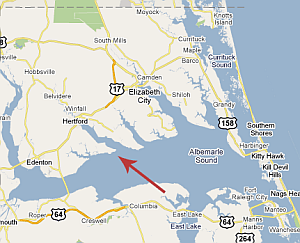THOMAS JARVIS
Governor: 1691-1694
by Dennis F. Daniels
Research Branch, NC Office of Archives and History, 2005; Revised October 2022
https://www.dncr.nc.gov/about-us/history/division-historical-resources/nc-highway-historical-marker-program
See also: Thomas Jarvis, Dictionary of North Carolina Biography
 Thomas Jarvis (d. 1694), deputy governor of North Carolina following the Lord Proprietors’s appointment of Philip Ludwell as the governor of the Carolina province, was among the earliest settlers in North Carolina. For two decades, he played an active role in colonial politics. Nothing survives to tell about Jarvis’s birth or parentage. Jarvis was married to a woman named Dorcas and had a son Foster and a daughter Dorcas. He was living in the Albemarle region by 1663. A land grant in that year issued by Virginia Governor William Berkeley to John Jenkins mentioned Jarvis’s land, near the Perquimans River and Albemarle Sound in an area that became known as Harveys Neck (present-day Perquimans County). He also owned a plantation on Whites Island (present-day Currituck County).
Thomas Jarvis (d. 1694), deputy governor of North Carolina following the Lord Proprietors’s appointment of Philip Ludwell as the governor of the Carolina province, was among the earliest settlers in North Carolina. For two decades, he played an active role in colonial politics. Nothing survives to tell about Jarvis’s birth or parentage. Jarvis was married to a woman named Dorcas and had a son Foster and a daughter Dorcas. He was living in the Albemarle region by 1663. A land grant in that year issued by Virginia Governor William Berkeley to John Jenkins mentioned Jarvis’s land, near the Perquimans River and Albemarle Sound in an area that became known as Harveys Neck (present-day Perquimans County). He also owned a plantation on Whites Island (present-day Currituck County).
Jarvis began his political career in 1672 as a member of Governor Peter Carteret’s council. In 1677 he served in the rebel assembly that met following Culpeper’s Rebellion. From 1683 through 1689 Jarvis was on the council during tenures of Governors Seth Sothel and John Gibbs. Jarvis was acting chief executive when former Governor John Gibbs decided to rebel against the Ludwell’s authority by disrupting a court and taking two magistrates as prisoners. In response to Gibbs’s actions, Jarvis and the council called out the militia to end the mutiny. They sent a letter to Virginia authorities seeking permission to send the militia into that colony to apprehend Gibbs. Furthermore, Jarvis and the council wrote to Ludwell, who was probably in Virginia, requesting him to come to Albemarle and asking him to seek help from Virginia in capturing Gibbs.
When the proprietors commissioned Ludwell as governor of the Carolina province in 1691, Ludwell appointed Jarvis as deputy governor of North Carolina. In that capacity, Jarvis served as acting governor when Ludwell, who maintained permanent residence in Virginia, was out of the colony. Jarvis officially held the governorship until his death in 1694. In a report provided to royal officials, Edward Randolph provided a biased observation of North Carolina under Jarvis’s leadership. He described North Carolina as having “sixty or seventy scattered families, but under no regular government.”
Very little is known about Jarvis’s private life. Jarvis’s 1694 estate inventory provided a glance at his life away from politics. He apparently made his primary residence on Whites Island and raised an abundance of livestock, especially cattle. Jarvis possessed whale tools meaning he was possibly involved in the hunting of whales along the coast. He owned at least seven enslaved people: two Native American people, three black people, and two multiracial people. His inventory showed a large amount of personal items including silverware, a looking glass, and numerous furnishings. In 1694 Jarvis’s son Foster and son-in-law Charles Neal appeared before the General Court seeking a division of Jarvis’s estate. Neal was representing his wife Dorcas and daughter Dorcas. The court ordered the division of Jarvis’ estate between Foster Jarvis and the widow.
References:
Cain, Robert J. 1984. Records of the executive council. Colonial records of North Carolina, v. 7-8-. Raleigh, N.C.: Dept. of Cultural Resources, Division of Archives and History.
Parker, Mattie Erma Edwards, William S. Price, and Robert J. Cain. 1968. North Carolina higher-court records. The Colonial records of North Carolina, v. [2]-. Raleigh, N.C.: State Dept. of Archives and History.
Powell, William Stevens. 1988. Dictionary of North Carolina biography. Vol. 3, H-K. Chapel Hill: University of North Carolina Press.
Raimo, John W. Biographical Directory of American Colonial and Revolutionary Governors, 1607-1789. Westpoint, Connecticut: Meckler Books, 1980.
Rankin, Hugh F. 1962. Upheaval in Albemarle; the story of Culpeper's Rebellion, 1675-1689. http://hdl.handle.net/2027/mdp.39015027788192.
Secretary of State. 1964. A truie nventory of estate of Thomas Jervis [sic] Esqr late deceased August 6, 1694. Council Minutes, Wills, and Inventories, 1677-1701. North Carolina State Archives, Raleigh, NC, US
University of North Carolina at Chapel Hill. 2008. Colonial and state records of North Carolina. [Chapel Hill, N.C.]: University Library, UNC-Chapel Hill. https://docsouth.unc.edu/csr/.
26 August 2005 | Daniels, Dennis F.